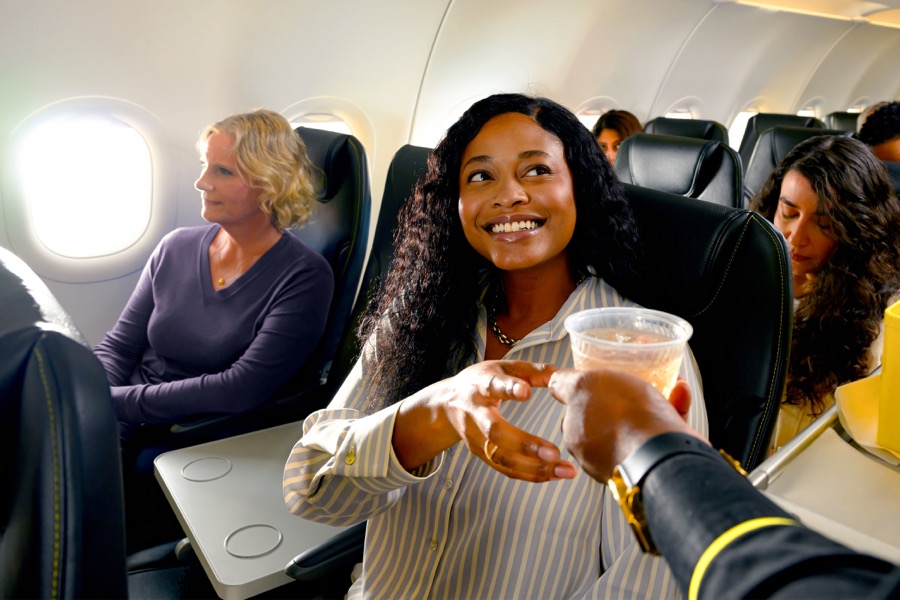Access selected deals available with budget and full-service airlines
Lock any airfare that sounds great. You don’t lose anything if you cancel it
Call us anytime for any assistance. We do not go into hibernation
Your personal and financial information stays secure with us
Spirit Airlines, Inc. is an American ultra-low-cost carrier headquartered in Dania Beach, Florida, in the Miami metropolitan area. As the leading ultra-low-cost airline in the United States, the Caribbean, and Latin America, Spirit operates over 600 daily flights to more than 73 destinations, serving as the seventh largest passenger carrier in North America as of 2023. Known for its unbundled fare model, dubbed "À La Smarte," Spirit allows passengers to pay only for the services they choose, such as baggage, seat assignments, and refreshments, making air travel accessible to budget-conscious travelers. Despite its low fares, the airline has faced significant challenges, including financial restructuring, customer service criticisms, and operational disruptions, but it continues to innovate with a modern fleet and new fare options to enhance the travel experience.

Spirit Airlines traces its roots to 1964 when it was founded as Clippert Trucking Company in Macomb County, Michigan. In 1974, it rebranded as Ground Air Transfer, Inc., and in 1983, it launched as Charter One Airlines, a Detroit-based charter tour operator offering travel packages to destinations like Atlantic City, Las Vegas, and the Bahamas. By 1990, the company leased two Convair 580 turboprops and began operating as Spirit Airlines, introducing scheduled flights in 1992 with four DC-9 aircraft. The airline’s early strategy focused on filling seats, leveraging its tour operator background to offer low-cost fares.
In 1996, Spirit launched a “Catch the Spirit” media campaign to reassure customers of its safety following the ValuJet crash, which stigmatized budget carriers. That same year, Janet Patton became Spirit’s first female pilot and, in 1998, its first female captain, marking a milestone in the airline’s history. Spirit relocated its headquarters from Eastpointe, Michigan, to Miramar, Florida, in December 1999, after considering Atlantic City and Detroit. The move positioned Spirit closer to its growing markets in the Caribbean and Latin America.
Spirit underwent significant growth in the 2000s, but not without challenges. In 2000, the FAA fined Spirit $67,000 for violations related to cabin and seat markings on its DC-9 and MD-80 aircraft. In 2006, Spirit transitioned to an ultra-low-cost model, introducing non-refundable tickets and eliminating traditional amenities like free meals and frequent flyer miles. In 2010, Spirit became the first U.S. airline to charge for carry-on bags, a practice later adopted by competitors like Allegiant and Frontier. The airline’s “Big Front Seat” (rebranded from Spirit Plus in 2007) offered a premium experience for an additional fee, replacing traditional business class.
The COVID-19 pandemic hit Spirit hard, leading to $334 million in CARES Act aid in 2020 to fund employees through September. The airline furloughed 20–30% of its workforce and faced a tragic incident when a passenger died of COVID-19 on a flight, with inadequate notification to other passengers. In 2021, Spirit canceled 40% of its flights due to weather and operational issues, stranding passengers without rebooking arrangements. In November 2024, Spirit filed for Chapter 11 bankruptcy, citing mounting debt, high operating costs, and competition, exacerbated by a failed $3.8 billion merger with JetBlue and engine issues grounding aircraft. The airline emerged in March 2025 after financial restructuring, continuing operations with a leaner network.
Spirit operates one of the youngest and most fuel-efficient fleets in the U.S., branded as the “Fit Fleet.” As of 2025, the fleet includes Airbus A320neo, A321neo, and A320ceo aircraft, designed for efficiency and reduced emissions. In July 2022, Spirit transitioned its inflight Wi-Fi to a new satellite, offering the fastest Wi-Fi service of any U.S.-based airline. The airline’s commitment to sustainability aligns with its mission to provide affordable travel while minimizing environmental impact.